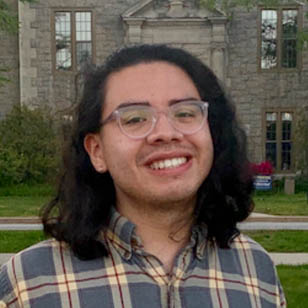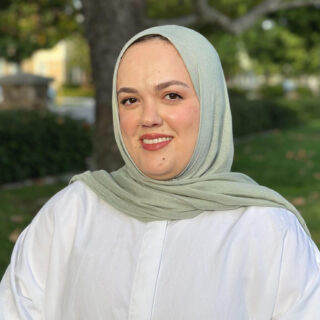Transportation Justice Fellow Spotlight: Rachel Brown, Jonathan Gomez-Pereira, and Nour Katabi
by Odochi Akwani, Writer and Content Manager
April 28, 2025
As part of a monthly series leading up to the 2025 NACTO Designing Cities Conference in Washington, D.C., we’re highlighting this year’s fellows to learn more about them and their work.
The Transportation Justice Fellowship, organized by NACTO as part of the Better Bike Share Partnership, builds community and skills among early- and mid-career people of color working to embed mobility justice in transportation. The Fellowship supports members of the cohort as they do the heavy work of operationalizing equity across the transportation field.
This month, we’d like to introduce fellows Rachel Brown, manager of transit infrastructure program planning at NJ Transit; Jonathan Gomez-Pereira, program manager at WalkMassachusetts; and Nour Katabi, program manager II at CALSTART.
Read their interviews below to learn how they each got into transportation, why transportation justice is important to them, and what their lives look like in New Jersey, Massachusetts, and California.
WHAT LED YOU TO PURSUE A CAREER IN TRANSPORTATION?
 “As an urban planner, I’ve always been fascinated by the hidden aspects of cities that many people overlook. When I discovered transportation planning, I realized how integral it had been in my own life—particularly the light rail station just across the street from my childhood home. It was a part of my daily routine, yet I had never really thought about its impact until I started to explore transportation planning. That’s when I realized this hidden world was something I wanted to unpack and dive into.” – Rachel Brown
“As an urban planner, I’ve always been fascinated by the hidden aspects of cities that many people overlook. When I discovered transportation planning, I realized how integral it had been in my own life—particularly the light rail station just across the street from my childhood home. It was a part of my daily routine, yet I had never really thought about its impact until I started to explore transportation planning. That’s when I realized this hidden world was something I wanted to unpack and dive into.” – Rachel Brown
 “I decided to pursue a career in transportation due to the huge impact access to transportation has played in my life. As a teenager, I had some level of independence, being able to access the T. As an adult, I quickly realized that having access to transportation can increase your quality of life by increasing access to recreation, work, education, housing, and healthcare. I’ve witnessed community members’ displacement due to rising costs and the challenges that limited transportation networks create. Creating robust transportation systems allows us to maintain our connections to our communities and support our well-being.” – Jonathan Gomez-Pereira
“I decided to pursue a career in transportation due to the huge impact access to transportation has played in my life. As a teenager, I had some level of independence, being able to access the T. As an adult, I quickly realized that having access to transportation can increase your quality of life by increasing access to recreation, work, education, housing, and healthcare. I’ve witnessed community members’ displacement due to rising costs and the challenges that limited transportation networks create. Creating robust transportation systems allows us to maintain our connections to our communities and support our well-being.” – Jonathan Gomez-Pereira
 “While working in community engagement and outreach, I had the opportunity to connect directly with residents and better understand the barriers they face. One issue that stood out was how transportation often acts as a barrier to accessing resources, whether that’s appointments, groceries, or community gatherings. Many people either don’t have access to a vehicle or choose not to drive, yet so many neighborhoods remain heavily car-dependent, which isn’t sustainable in the long term. That experience deepened my interest in transportation and highlighted how critical it is to center community voices when shaping mobility systems and services.” – Nour Katabi
“While working in community engagement and outreach, I had the opportunity to connect directly with residents and better understand the barriers they face. One issue that stood out was how transportation often acts as a barrier to accessing resources, whether that’s appointments, groceries, or community gatherings. Many people either don’t have access to a vehicle or choose not to drive, yet so many neighborhoods remain heavily car-dependent, which isn’t sustainable in the long term. That experience deepened my interest in transportation and highlighted how critical it is to center community voices when shaping mobility systems and services.” – Nour Katabi
WHY IS TRANSPORTATION JUSTICE IMPORTANT TO YOU?
“Transportation justice is important to me as a transportation planner because it provides a framework that centers equity, fairness, and social justice in how transportation systems are planned, built, and operated. It recognizes that access to safe, affordable, and reliable transportation is a basic right — not a privilege — and that historically marginalized communities have often been excluded from or harmed by transportation decisions. I care about transportation justice because I believe the right to mobility is a foundation for equity, freedom, and opportunity.” – Rachel Brown
“I understand transportation justice to be deeply connected to other social justice movements, such as housing justice. Transportation justice is particularly important as low-income and BIPOC communities are disproportionately displaced, limiting access to essential services like public transportation and walking infrastructure. If we plan to build ourselves out of the housing crisis, it’s critical that we have equitable access to transportation to maintain our connections to the communities we call home.” – Jonathan Gomez-Pereira
“Transportation justice is essential as it invests in marginalized communities that have been systematically neglected and underserved. By transforming transportation through equity and accessibility, it centers communities and addresses barriers to ensure they feel safe and have reliable mobility options. Through community-informed and -led solutions, residents get to make choices in how they arrive at their destination. Thus, it builds stronger communities and ensures that their mode of transportation is reliable, safe, and affordable. Everyone deserves safe mobility solutions, and there isn’t a singular linear way to address transportation inequity.” – Nour Katabi
WHAT DO YOU ENJOY MOST ABOUT WHERE YOU LIVE?
“I love the convenience of living in downtown Newark. Being able to walk to the Newark Museum and the main library is a huge plus, especially since I’m passionate about history, culture, and art. Living near the arts and education district allows me to feel like I’m contributing to the community’s creative energy. Additionally, I really appreciate how close I am to Newark Penn Station, with easy access to the local and regional transportation network. The northeast feels full of endless options and opportunities to explore, and I’m lucky to be at the heart of it.” – Rachel Brown
“I enjoy living by the water. I live along Chelsea Creek. Further up on the creek is a bit of remaining salt marsh, which is a beautiful and resilient reminder of what the space my home once occupied.” – Jonathan Gomez-Pereira
“What I enjoy most about living in Orange County is the balance it offers across so many things I value. You can’t beat the SoCal weather, and being so close to the beach is a huge plus. I also love that it’s nestled between Los Angeles and San Diego. It brings together a mix of cultures and energy while still offering space to find a supportive community where you can share ideas, worries, and meaningful moments. I appreciate having the accessibility to take the train to either city to beat the traffic congestion and carbon emissions.” – Nour Katabi
WHAT’S YOUR FAVORITE WAY TO SPEND A WEEKEND?
“My ideal weekend begins with a walk through Branch Brook Park, a place that always helps me feel calm and grounded. I love spending hours in the pottery studio, either getting lost in the creative process or catching up with friends over lunch or dinner. Sundays are reserved for unwinding—tending to my apartment, hitting the gym, and preparing a nice meal. It’s my perfect blend of relaxation and self-care.” – Rachel Brown
“During the warmer months, I enjoy being able to get out on my bike and ride around the Charles River Esplanade. Folks can find me circling around with my headphones on, either listening to music or an audiobook.” – Jonathan Gomez-Pereira
“My favorite way to spend the weekend usually starts with hitting a new hiking trail or revisiting a favorite one. After that, I like to stop by a local coffee shop for breakfast and try out different coffee roasts. I really enjoy being outdoors, and weekends are also a great time for me to catch up with family and friends.” – Nour Katabi
__________________________________________________________________________________________
The Better Bike Share Partnership is funded by The JPB Foundation as a collaboration between the City of Philadelphia, the National Association of City Transportation Officials (NACTO), and the PeopleForBikes Foundation to build equitable and replicable bike share systems. Follow us on LinkedIn, Facebook, Twitter, and Instagram, or sign up for our weekly newsletter.
Have a question or a story idea? Email odochi@peopleforbikes.org.
